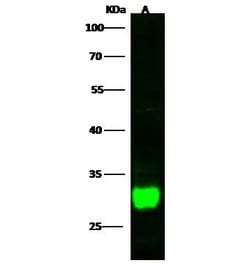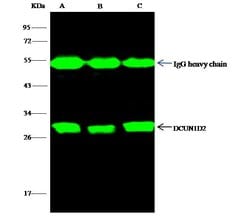Learn More
Invitrogen™ DCUN1D2 Recombinant Rabbit Monoclonal Antibody (001)
Rabbit Recombinant Monoclonal Antibody
Supplier: Invitrogen™ MA529212
Description
This product is preservative free. It is recommended to add sodium azide to avoid contamination (final concentration 0.05%-0.1%). Recombinant rabbit monoclonal antibodies are produced using in vitro expression systems. The expression systems are developed by cloning in the specific antibody DNA sequences from immunoreactive rabbits. Then, individual clones are screened to select the best candidates for production. The advantages of using recombinant rabbit monoclonal antibodies include: better specificity and sensitivity, lot-to-lot consistency, animal origin-free formulations, and broader immunoreactivity to diverse targets due to larger rabbit immune repertoire. This antibody has specificity for Human DCUN1D2/DCN1-like protein 2.
Potently stimulates the neddylation of cullin components of SCF-type E3 ubiquitin ligase complexes from the NEDD8-conjugating E2 enzyme UBC12. Neddylation of cullins play an essential role in the regulation of SCF-type complexes activity. [UniProt].
Specifications
| DCUN1D2 | |
| Recombinant Monoclonal | |
| 1 mg/mL | |
| PBS with no preservative | |
| Q6PH85 | |
| DCUN1D2 | |
| Recombinant Human DCUN1D2/DCN1-like protein 2 Protein (Met1-Phe259). | |
| 100 μL | |
| Primary | |
| Human | |
| Antibody | |
| IgG |
| ELISA, Immunoprecipitation, Western Blot | |
| 001 | |
| Unconjugated | |
| DCUN1D2 | |
| AW495713; C13orf17; DCN1, defective in cullin neddylation 1, domain containing 2; DCN1, defective in cullin neddylation 1, domain containing 2 (S. cerevisiae); DCN1-like protein 2; DCN1-like protein 2; LOW QUALITY PROTEIN: DCN1-like protein 2; DCUN1 domain-containing protein 2; Dcun1d2; DCUN1L2; defective in cullin neddylation 1 domain containing 2; defective in cullin neddylation protein 1-like protein 2; mFLJ10704; RGD1311743; squamous cell carcinoma-related oncogene | |
| Rabbit | |
| Protein A | |
| RUO | |
| 55208 | |
| Store at 4°C short term. For long term storage, store at -20°C, avoiding freeze/thaw cycles. | |
| Liquid |
Your input is important to us. Please complete this form to provide feedback related to the content on this product.

